ESSENTIALS
The Essentials
CREATED@CORNELL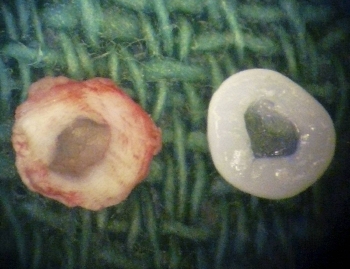
Left, natural rat disc compared with engineered disc, right. See larger image
Bioengineered spinal disc implants may relieve chronic back pain
Cornell engineers in Ithaca and doctors at Weill Cornell Medical College (WCMC) have created a biologically based spinal implant that could mean relief for sufferers of lower back and neck pain.
Larry Bonassar, associate professor of biomedical engineering and mechanical engineering, and Roger Härtl, WCMC associate professor of neurosurgery and chief of spinal surgery at NewYork-Presbyterian Hospital/Weill Cornell Medical Center, have created an artificial implant to replace intervertebral discs in the spinal column. Their work was published online in Proceedings of the National Academy of Sciences in July.
Bonassar's lab, which focuses on the regeneration and analysis of musculoskeletal tissue, engineered the artificial discs from two polymers – collagen and a hydrogel called alginate. They seeded the implants with cells that repopulate the structures with new tissue. Remarkably, unlike the artificial implants of today that degrade over time, the scientists are seeing that these implants perform better as they mature in the body, due to the growth of the cells.
The scientists are hoping to move their experiments into larger animals, possibly working with the College of Veterinary Medicine, with the goal of implanting the devices in humans.
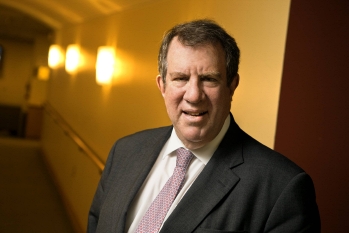
Andrew Tisch '71 See larger image
Andrew Tisch '71 to co-lead Cornell's capital campaign
A devoted alumnus and supporter of Cornell faculty, Andrew Tisch '71 has been named co-chair of Cornell's comprehensive campaign as it continues through the university's sesquicentennial in 2015.
Vice chairman of the Cornell Board of Trustees and a member of its Executive Committee, Tisch succeeds Jan Rock Zubrow '77, who served as campaign co-chair since 2006 and has recently been named chair of the board's Executive Committee. Tisch will co-lead the campaign with Stephen Ashley '62, MBA '64, and Robert Appel '53, who heads the Weill Cornell Medical College campaign.
Tisch said the campaign has been "very successful" thus far. He looks forward to working with the campaign's trustee leadership, as well as the "top-notch" staff led by Charlie Phlegar, vice president for alumni affairs and development.
"My goal is not to make radical changes on what's working already, but rather to build on the success that we've had thus far," Tisch said.
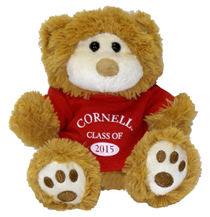
Cornell's just-entered freshman class is the Class of 2015, the year that marks the university's sesquicentennial. See larger image
Increased diversity in sesquicentennial class
Cornell's entering freshman class – the class that will graduate in 2015, the university's sesquicentennial – is more diverse than its predecessors.
"Cornell's Class of 2015 will join the university at a time when it begins to celebrate its heritage of 150 years shaped by Ezra Cornell's revolutionary vision to 'found an institution where any person can find instruction in any study,'" said Barbara Knuth, Cornell vice provost and dean of the Graduate School. "That heritage is enriched once again this year, as the university continues to attract students from all over the world and from diverse racial and socio-economic backgrounds."
The number of international students has increased to 349, a 24 percent hike over last year's freshman class; international students represent 10 percent of the Class of 2015 and come from 45 countries.
And while 41 percent of the new class identify themselves as Caucasian (down from nearly 46 percent in 2010), more than 36 percent of the class identify themselves as students of color. For example:
- 549 students, up from 481, identify as Asian-American; or 16 percent, up from 15 percent, of the class;
- 209 identify as black or African-American, up from 172; or 6 percent, up from 5 percent; and
- 387 identify as Hispanic/Latino, up from 327; or 12 percent, up from 10 percent.
Fear no weevil
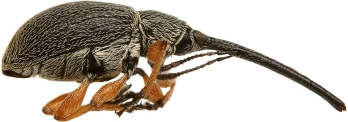
One of Kent Loeffler's photographs of a weevil. See larger image
Weevils: destroyers of crops … biocontrol agents … charismatic beauties?
In Mann Library Gallery, visitors can examine weevils in a way they've never seen them before: through an exhibition of staff member Kent Loeffler's dazzling photographs. The extraordinarily detailed digital images are magnified hundreds of times. The results reveal weevils as sculptural forms in dazzling colors, jeweled, lacquered, feathered and furred.
The weevils will be on display in Mann through Sept. 30, and a selection of the images is available as a slide show online at mannlib.cornell.edu. Cornell entomologist E. Richard Hoebeke's forthcoming book, "An Illustrated Identification Guide to the Adventive (Non-Native) Weevils (Curculionoidea) of North America," also features the fair weevil.
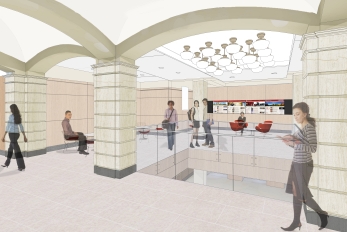
Architect's rendering of Warren Hall's renovated first-floor lounge. See larger image
Warren Hall renovation blends old with new
Cornell's 80-year-old Warren Hall is ready for a $32 million revitalization.
Construction on the Beaux Arts-style building at the northeast corner of the Ag Quad has begun and will continue through 2015.
Peter Schrempf, program manager for the College of Agriculture and Life Sciences, said the transformed building will be a great improvement, as Warren Hall no longer meets the needs of the departments it houses.
While academic functions of the 128,355-square-foot, four-floor building will benefit from the modernization of the facility, elements of the building will be preserved to maintain the character and style of its original design. Built in 1932 for $500,000, the brick and stone exterior, as well as the lobby and lecture halls, will undergo complete restoration.
Despite the logistical challenges of relocating 300 people during the project, "We plan to continue business as usual," said Professor Loren Tauer, the David J. Nolan Director of the Dyson School. "Many of us will be even closer to Manndibles for coffee."
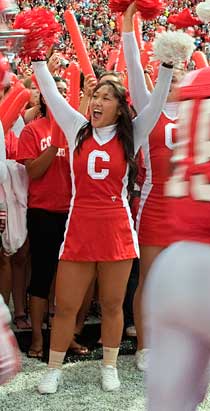
Big Red cheerleader See larger image
Cornell Annual Fund crosses $30 million mark for first time
In the fiscal year that ended June 30, the Cornell Annual Fund raised $30,086,159, surpassing a long-standing goal of $30 million and setting an all-time record.
"At the onset of the campaign, we laid out the ambitious goal of doubling our Annual Fund by 2011 and reaching $30 million," said Joe Lyons '98, the fund's director.
Annual Fund gifts are unrestricted, current-use gifts that donors can direct to a handful of general areas – including undergraduate colleges, professional schools, undergraduate student aid and such universitywide units as athletics. While $30 million represents only about one-tenth of charitable gifts to the university in a given year (excluding those to Weill Cornell Medical College), it has a disproportionately large impact on Cornell's ability to support its top priorities.
More than 32,000 alumni, students, parents and friends made Annual Fund gifts in fiscal year 2011, up from 26,000 donors in 2005.
"This is truly a milestone accomplishment by hundreds of dedicated alumni and parent volunteers, and most of all, of course, our committed and generous Annual Fund donors," said Annual Fund national chair Robert Katz '69.